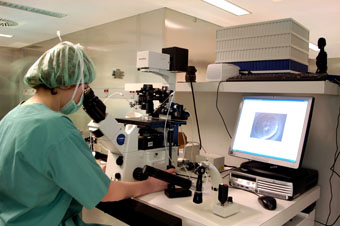
A study of the Foundation IVI (FIVI) has just proved one of the most pursued hypothesis in the field of the reproductive genetics: the existence of the communication among the pregnant mother and her embryo, prior to the moment of being implanted in the uterus. Said communication is produced by molecules secreted by the maternal endometrium, then internalising in the embryo cells, giving way to modifications at the genome of the future baby.
The study titled ‘Hsa-miR-30-d, secreted by the human endometrium, is taken up by the pre-implantation embryo and might modify its transcriptome’, published by the journal Development by the researchers Felipe Vilella (FIVI) and Carlos Simón –scientific leader of FIVI and IGENOMIX, both entities located at the Science Park of the Universitat de València–, shows for the first time in the genetics history that there is a communication between the expectant mother and the embryo, causing modifications in the genome of the future baby.
The work describes how molecules that regulate the transcription secreted by the maternal endometrium act as transcriptomics modifiers of the implantation of the embryo, that is, that before the embryo implantation in the maternal uterus it is produced, in the endometrium, an interchange of molecules that ends up modifying the genes transcription, producing epigenetic changes that come from the communication between mother and embryo. The mother may, thus, modify the epigenetic information of the child, even when the egg is from a donor.
“This finding shows us something that we already suspected by the coincidence of some physical traits between mothers and egg donation children; resemblances so important that they could not be just a coincidence”, explains Felipe Vilella. “For example, in the case of patients with obesity we observed that, in a high proportion, their offspring also suffered from obesity, and this factor could not just be related with a malfunction in the eating habits”, concludes.
Determined conditions, such as smoking or obesity, cause different changes at a cell level affecting also the cells of the endometrium. This produces that molecules are secreted to the endometrial liquid, which in normal conditions would not be there. These molecules are internalised by the cells of the embryo being able of modifying, this way, their development.
“This communication can induce that in the embryo specific functions are expressed or inhibited, producing modifications that show us the transmission process of diseases as the Diabetes or Obesity”, have explained the researchers. “From now on we will work to find in a future the way of avoiding this kind of diseases when their cause is epigenetic.”
On IVI
IVI was created in 1990 as the first medical institution in Spain fully specialised in human reproduction. Nowadays it has over 40 clinics in 10 countries and is European leader in reproductive medicine.
On Foundation IVI
The Foundation IVI is the first one in Spain dedicated to the basic research applied in the field of Human Reproduction and provides services of science, teaching, and social nature. It is part of the Science Park, the scientific and technical business bluster of the Universitat de València and is the department for research and scientific support of IVI.
Last update: 22 de september de 2015 13:00.
News release



















